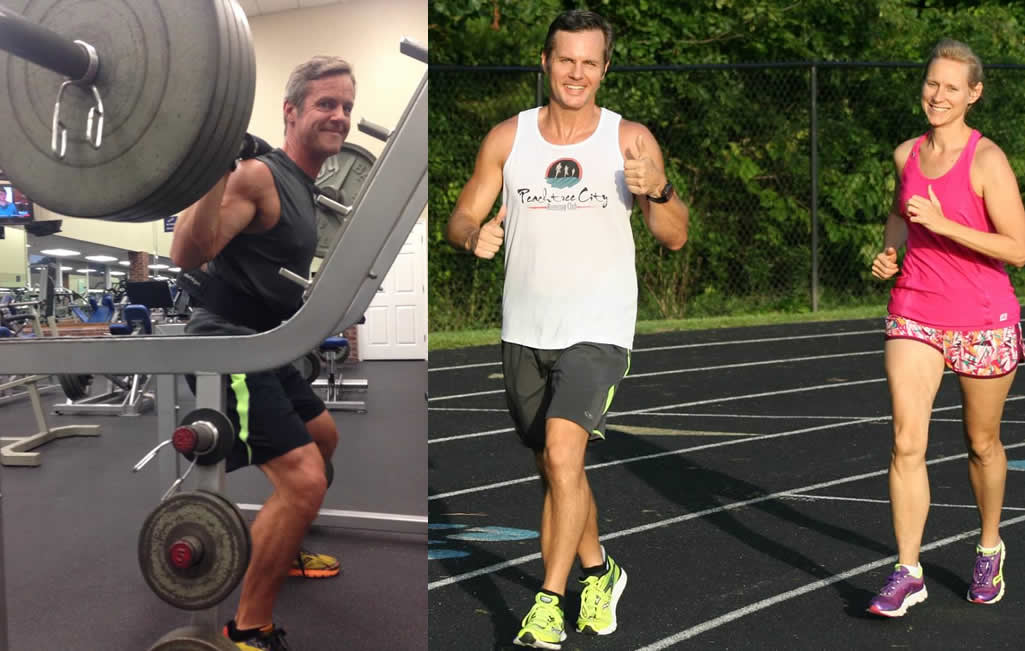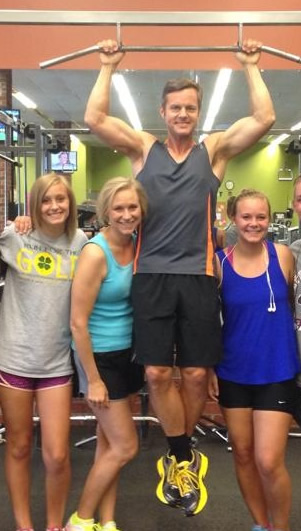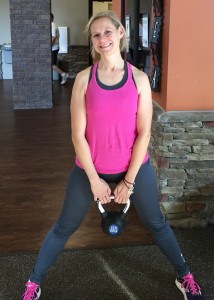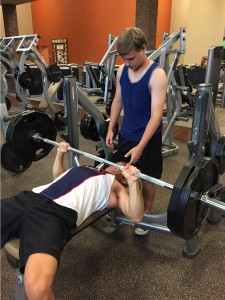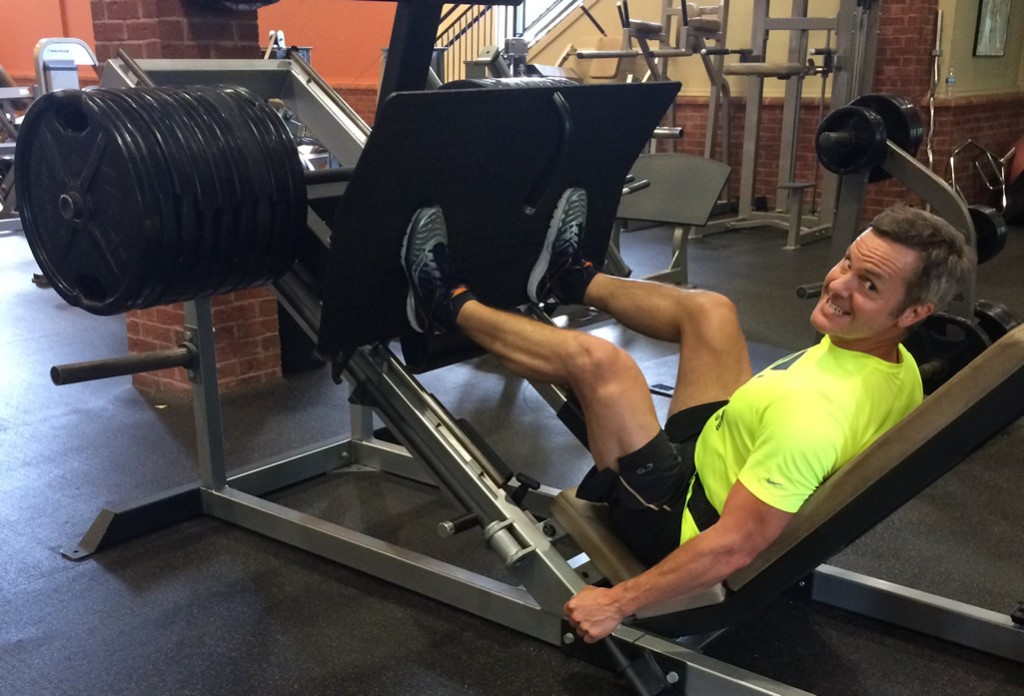Strength Training Tips for Runners
Hey runners, it’s a new year (the start of 2016 as I write this) and it’s time to try some new things in your training. Let me ask you some questions:
- How many push-ups can you do?
- Can you do a pull-up – if so, how many?
- Can you squat down without hurting yourself – how about with weight?
- Do you know how to pick something up without hurting yourself – with something heavy ?
There is more to fitness than running and it’s taken me over 20 years of running to find that out. I got serious about strength training about three years ago and here’s what I’ve learned (see notes at the end of the article).
My Wake-up Call
Elsewhere in this website, you can read about how we lost weight and got in shape. Well, in hindsight I probably took that to extremes and became a “cardio junky”. During my peak running years (1999-2002) I was a pretty fast runner, but I was also small (and weak). I continually got injured and sick. It did not seem healthy I could do an Ironman triathlon, yet not do pull-ups. Is there a way to be strong and fast?
More and more research is indicating that cardio training alone is necessary, but not sufficient for good health. That research has worked it’s way into the running community. Some very big names in running like Meb Keflezighi, winner of the 2014 Boston Marathon and author of “Meb for Mortals”, talk about the importance of strength training. Doctors like Jordan Metzel, M.D., Ironman athlete and author of “Running Strong” and the “IronStrength” workout, are promoting the necessity of strength training for runners.
Perhaps my wake-up call could be summarized with these two questions:
- The “visual” test – did I look healthy?
- The “feeling” test – did I feel healthy?
Myths About Strength Training
There is a classic antagonism between weightlifters and runners. Go into the “free weights” section of any gym and strike up a conversation about running. Many of the hardcore lifters will regard running as a muscle-depleting, “catabolic” disaster to be avoided. Try talking about weightlifting at the starting line of a marathon. Many of those lean, swift marathon runners (and I used to be one) will regard weightlifting as something that’ll slow you down and get your hurt. Here are some common myths about running and strength training that are just plain WRONG:
- Weight lifting makes you big, bulky and slow
- Runners don’t need to do resistance training
- The only way to get faster is run more and run faster
- Runners should use light weights
- Runners should only lift during the off-season
- Weight lifters aren’t fast runners
- Weight lifters can’t run and runners can’t lift
Is it possible to be strong and fast? Is it possible to be a runner and a strength trainer? Not only do we (Mary Catherine and Joe) both aspire to be fast and strong runners, but we think it’s imperative for overall health and well-being. In fact, I have a confession to make. I take a bit of pride when I win an award at a road race and someone notes that I’m pretty fast for a big guy (I just hope they mean muscles and not my belly). In like manner, it’s fun to tell my weight lifting friends that I just raced a 5K and then I out lift them in the gym. At one road race, the local Marine recruiters had set-up a pull-up bar at the finish line and as an old man, I outran and did more pull-ups than the younger Marine sergeant. Go Army!
How about the ladies? Should girls lift weights? Absolutely! Weight training isn’t just for men. By the way, Mary Catherine got Joe into weight training and not the other way around! Ladies, weights won’t bulk you up or make you un-feminine. Quite the contrary. Muscles are sexy on men and women!
Key Strength Training Concepts
There’s no question that the principle of “specificity of training” comes into play when you’re designing a training program. Yes, in order to run faster – you need to run AND in order to lift more weight, you need to lift more. While that may be self-evident, it’s also important to recognize the synergy of strength training and running. Running, even running hills, does not provide enough of a strength training workout for total body strength.
Running does NOT work all of your muscles evenly. Running with no other exercise can create muscle imbalances which is why runners are injury-prone.
Lifting, even full-body power lifting, does not improve your long-term cardiovascular endurance or running speed. I believe you need both running and lifting for total fitness.
In a previous blog post, we covered three key running workouts and won’t repeat that here. Here are some key strength training concepts I follow that are adapted for runners:
- Muscular mass vs. strength vs. endurance – As a runner, you’re going to be most interested in strength and endurance. Consider using heavy weights for strength (e.g. squats) and doing body weight exercises for endurance (e.g. push-ups)
- Free-weights vs. machines – Free weights provide a better overall workout emphasizing stability and strength. Machines are a good introduction to resistance training and useful when recovering from injury.
- Major body parts – Legs, Chest, Back, Arms, and Abs.
- How often & how much? I try to lift 4 days a week – Legs 2 days a week and everything else 2 days a week. Bodybuilders usually do one major body part a week. If you’re pressed for time, you could do all body parts in a single workout a few times a week.
- “Classic” prescriptions of sets and reps
- Endurance: 3-5 sets of 15-20 reps
- General fitness: 3 sets of 8-12 reps (Recommended)
- Strength: 5 sets of 5 reps
- Power: 8 sets of 1-2 reps
In a future article we’ll share with you some of our favorite lifts and strength training exercises.
Tips for Integrating Strength Training and Running
- Plan around your key running workouts – you’re a runner so that has to take priority on your training schedule.
- Decide your strength training goals and work accordingly
- Don’t be afraid to lift heavy, it’s the only way to get stronger
- Avoid running the day after a hard leg workout, unless you’re purposely trying to train on tired legs (which is a good workout to do every once in awhile)
- Lift, refuel, run if you have to double-up. Why lift first? As a runner you’ll probably go too fast and then be too tired for proper lifting form. Lifters tend to do the opposite and run before lifting.
- Eat more protein than you would as just a runner. Protein helps rebuild muscle.
- Eat more carbs than you would as just a lifter. Carbs are fuel and you need fuel.
- Form is more important than weight, but that’s pretty important too
- Pay attention to your body – just as you already do with running. Have a persistent hurt? Take a day off.
- Don’t forget flexibility training, it’ll make you a better runner & lifter
- Change things up on the road and in the gym so you don’t plateau
- Have fun!
Suggested Resources
There are some great books and websites with resources for runners who are interested in strength training. Here are a few of our favorites:
- Run Less, Run Faster by: Bill Pierce EdD, Scott Murr EdD, and Ray Moss PhD
- Encyclopedia of Muscle & Strength, Second Edition by: Jim Stoppani, PhD
- The Runner’s Body by: Ross Tucker, PhD & Jonathan Dugas, PhD
- Meb for Mortals by: Meb Keflezighi & Scott Douglas
- Running Strong by: Jordan Metzl, MD & Claire Kowalchik
A Few Important Notes
Since this article contains fitness advice, it’s important to disclose and say a few things:
- I am a former USA Triathlon Coach and AFAA-certified personal trainer (and earned other fitness certifications that I won’t bore you about). My certifications have lapsed and I’m no longer a trainer/coach except for my own personal fitness. If you want the latest training information, seek a currently certified fitness professional (like Mary Catherine, who is a currently certified personal trainer and co-wrote this article).
- My perspective is that of a runner who also lifts weights (and not the other way around). That’s important to know because I’m a relative newcomer to serious weight training.
- In training, there are multiple paths to get to the same destination or goal. Some methods are more effective than others and it’s ultimately up to you to discover what works for you. Don’t let someone tell you there’s only one “secret” way to train. Be informed, be open-minded, but have a healthy skepticism and do your own homework!
- The information in this article is adapted from a presentation I made to the Peachtree City Running Club in June 2013.

